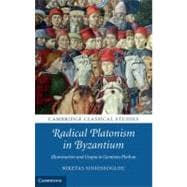
Note: Supplemental materials are not guaranteed with Rental or Used book purchases.
Purchase Benefits
What is included with this book?
| Preface | p. ix |
| List of abbreviations | p. xiii |
| Introduction: Plethon and the notion of paganism | p. 1 |
| Plato's escape from Athos | p. 1 |
| The argument | p. 11 |
| Structure and outline of the book | p. 38 |
| Lost rings of the Platonist golden chain | |
| Underground Platonism in Byzantium | p. 49 |
| Towards a reformulation of K. N. Sathas' thesis | p. 49 |
| Divine Plato: pagan Platonic dissonance in late antiquity | p. 54 |
| Occult Plato: Hellenism and the first Byzantine humanism | p. 62 |
| Secular Plato: Psellos and the art of dissimulation | p. 71 |
| The twelfth-century Proklosrenaissance and Theodore Metochites | p. 85 |
| The rise of the Byzantine Illuminati | p. 93 |
| How to see god: the quest for the Thabor light | p. 93 |
| The 'Enlightened-ones': anti-Hesychast discourse according to Palamite sources | p. 100 |
| Plethon and the twilight of Palamism | p. 114 |
| The last ring of the Platonist golden chain: the Platonic fraternity of Mistra | p. 119 |
| The Plethon affair | p. 125 |
| George of Trebizond and Scholarios against Plethon | p. 125 |
| Juvenalios | p. 134 |
| The Nomoi in flames | p. 138 |
| The accusation of dissimulation | p. 141 |
| The puzzle of the Nomoi | p. 148 |
| The elements of pagan Platonism | |
| Epistemic optimism | p. 163 |
| Intellectual versus spiritual illumination | p. 163 |
| The intellection of 'Zeus' | p. 169 |
| Plethon's Plato | p. 190 |
| The Byzantine civil war on illumination | p. 199 |
| The Chaldean Oracles reloaded | p. 212 |
| Pagan ontology | p. 223 |
| Towards a new ontology | p. 223 |
| The threat of 'one genus of everything, Being' | p. 226 |
| Against the equivocity of Being | p. 230 |
| A return to Parmenides | p. 240 |
| That 'Zeus' is not beyond Being | p. 243 |
| Re-sacralising the physical world | p. 250 |
| Unearthing the pagan hereditas damnosa | p. 263 |
| Symbolic theology: the mythologisation of Platonic ontology | p. 278 |
| Palamite 'energies' and Plethonean 'gods' | p. 278 |
| Paganism in the Differences: Forms as intellects, creators and originators | p. 293 |
| The strange case of Monodia in Helenam | p. 300 |
| Polytheism, necessity and freedom | p. 306 |
| Fate | p. 313 |
| Mistra versus Athos | |
| Intellectual and spiritual Utopias | p. 327 |
| The birth of social engineering: the Memoranda | p. 327 |
| Three paths to salvation: Kydones, Scholarios, Plethon | p. 347 |
| The secular turn | p. 359 |
| Paganism and totalitarianism: the Memoranda in their relation to the Nomoi | p. 384 |
| The path of Ulysses and the path of Abraham | |
| Conclusion | p. 395 |
| The origins of Plethon's pagan Platonism: the developmentalist thesis | p. 395 |
| The essence of pagan Platonism | p. 403 |
| Philosophical implications of the Plato-Aristotle controversy | p. 408 |
| Political implications of the Plato-Aristotle controversy | p. 414 |
| Epilogue: 'Spinozism before Spinoza', or the pagan roots of modernity | p. 418 |
| Bibliography | p. 427 |
| Index | p. 447 |
| Table of Contents provided by Ingram. All Rights Reserved. |
The New copy of this book will include any supplemental materials advertised. Please check the title of the book to determine if it should include any access cards, study guides, lab manuals, CDs, etc.
The Used, Rental and eBook copies of this book are not guaranteed to include any supplemental materials. Typically, only the book itself is included. This is true even if the title states it includes any access cards, study guides, lab manuals, CDs, etc.